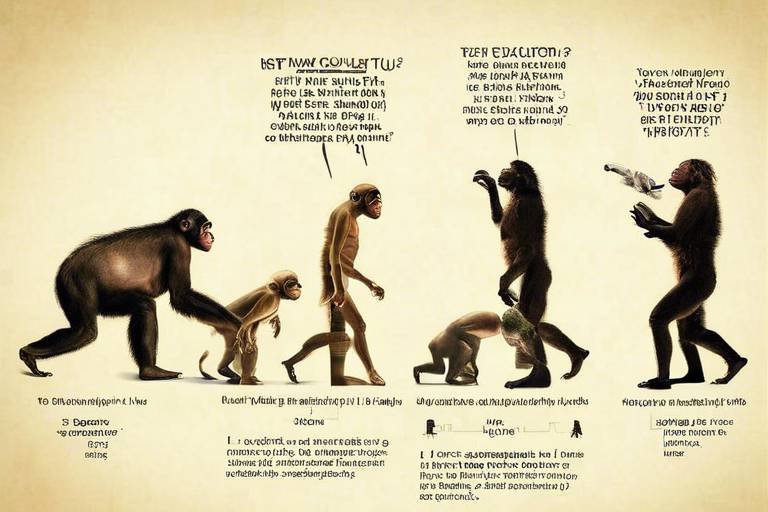Problematics of Philosophy in Physical Sciences
The intricate relationship between philosophy and physical sciences is a fascinating topic that invites deep reflection and analysis. At first glance, one might think that science is purely empirical, grounded in observable phenomena, while philosophy operates in the realm of abstract thought. However, these two fields are intertwined in ways that profoundly influence how we understand the universe. The problematics of philosophy in physical sciences encompass a myriad of issues, debates, and implications that arise when we question the very foundations of scientific inquiry.
Consider this: every time a scientist formulates a hypothesis, they are engaging in a philosophical act. They are not just observing phenomena; they are interpreting them, asking why things happen the way they do, and seeking to understand the underlying principles that govern the natural world. This interplay between observation and interpretation raises essential questions about the nature of scientific knowledge. What constitutes valid evidence? How do we differentiate between mere correlation and causation? And, importantly, how do our philosophical beliefs shape our scientific practices?
Moreover, the philosophical debates surrounding the nature of scientific theories add another layer of complexity. Are scientific theories mere constructs that help us make sense of the world, or do they reflect an objective reality? This question leads us into the realms of scientific realism and anti-realism, where philosophers argue over whether our scientific theories truly describe the world as it is or if they are simply useful fictions. Thus, the problematics of philosophy in physical sciences are not just academic musings; they have real implications for how we conduct research, interpret data, and ultimately understand our place in the universe.
As we delve deeper into this topic, we will explore various aspects of the relationship between philosophy and physical sciences. We will examine the nature of scientific inquiry, the epistemological questions that arise, the role of observation, the theoretical frameworks scientists use, and the ethical dimensions of scientific practice. Each of these areas reveals the profound impact that philosophical thought has on the physical sciences, highlighting that the quest for knowledge is as much about asking the right questions as it is about finding the right answers.
In conclusion, the problematics of philosophy in physical sciences serve as a reminder that scientific inquiry is not a solitary endeavor. It is a collaborative dance between empirical evidence and philosophical reflection, where each step taken in the laboratory is informed by the questions we dare to ask. As we navigate this complex landscape, we must remain cognizant of the philosophical underpinnings that shape our understanding of the natural world and the responsibilities that come with that knowledge.
- What is the relationship between philosophy and physical sciences?
Philosophy provides the foundational questions and frameworks that guide scientific inquiry, influencing how we interpret and validate knowledge. - Why is observation significant in scientific practice?
Observation is crucial as it forms the basis for empirical data, but it is also subject to interpretation and potential bias. - What are scientific realism and anti-realism?
Scientific realism posits that scientific theories accurately describe the world, while anti-realism argues that theories are merely useful tools without necessarily reflecting reality. - How does ethics play a role in physical sciences?
Ethical considerations are vital in guiding research integrity and assessing the societal impact of scientific advancements.

The Nature of Scientific Inquiry
Scientific inquiry is not just a mechanical process of collecting data; it's a dynamic interplay between observation, theory, and philosophical reflection. At its core, scientific inquiry seeks to unravel the mysteries of the universe, but how we go about that can be profoundly influenced by philosophical principles. Think of it as a dance: the scientists lead with their hypotheses, while philosophy provides the rhythm and structure that keeps the dance from becoming chaotic.
Philosophy lays the groundwork for the methodologies we use in scientific research. For instance, the scientific method—a systematic approach to inquiry—has its roots in philosophical thought. It emphasizes the importance of formulating hypotheses, conducting experiments, and drawing conclusions based on empirical evidence. Yet, beneath this structured approach lies a plethora of philosophical questions: What constitutes evidence? How do we know what we know? These questions challenge us to think critically about the assumptions we make in our scientific practices.
Furthermore, the nature of scientific inquiry is shaped by the context in which it occurs. Different scientific disciplines may prioritize different methodologies and epistemologies. For example, the methods used in physics may differ vastly from those in psychology or sociology. Each field has its unique challenges and philosophical considerations that influence how knowledge is produced and validated. This diversity is crucial because it allows for a more comprehensive understanding of the world around us.
In addition, the role of collaboration in scientific inquiry cannot be overstated. Scientists often work in teams, bringing together a variety of perspectives and expertise. This collaborative approach enriches the inquiry process, allowing for a more nuanced understanding of complex phenomena. However, it also raises philosophical questions about the nature of knowledge: Who gets to claim ownership of scientific discoveries? How do we navigate differing interpretations of data?
As we delve deeper into the nature of scientific inquiry, we must also consider the impact of technological advancements. The tools we use to gather and analyze data can profoundly alter our understanding of scientific phenomena. For instance, the invention of the telescope opened new frontiers in astronomy, while advancements in computer technology have revolutionized data analysis in various fields. Yet, these tools also come with their own set of philosophical implications. How do we ensure that technology serves to enhance our understanding rather than distort it?
In summary, the nature of scientific inquiry is a complex tapestry woven from threads of observation, theory, and philosophy. It challenges us to question our assumptions, embrace collaboration, and stay attuned to the technological influences that shape our understanding of the world. As we continue to explore the intricate relationship between philosophy and the physical sciences, one thing becomes clear: the quest for knowledge is as much about asking the right questions as it is about finding the answers.
- What is the scientific method? The scientific method is a systematic approach to inquiry that involves formulating hypotheses, conducting experiments, and drawing conclusions based on empirical evidence.
- How does philosophy influence scientific inquiry? Philosophy shapes the methodologies and epistemologies used in scientific research, prompting critical questions about evidence, knowledge, and the nature of reality.
- Why is collaboration important in scientific research? Collaboration brings together diverse perspectives and expertise, enriching the inquiry process and allowing for a more nuanced understanding of complex phenomena.
- What role do technological advancements play in science? Technological advancements provide new tools for data collection and analysis, but they also raise philosophical questions about the nature of knowledge and understanding.

Epistemology and Physical Sciences
Epistemology, the study of knowledge, plays a crucial role in the realm of physical sciences. It raises fundamental questions about how we know what we know and the validity of that knowledge. In the physical sciences, where empirical evidence reigns supreme, understanding the epistemological framework is essential. We often ask ourselves: What constitutes valid knowledge in science? How do scientists determine the reliability of their findings? These questions are not just academic; they have real-world implications for how scientific theories are constructed, validated, and sometimes challenged.
At the heart of epistemology in physical sciences lies the concept of justification. This involves understanding the processes through which scientific claims are substantiated. Typically, knowledge in physical sciences is constructed through a combination of observation, experimentation, and theoretical modeling. Each of these components contributes to the larger picture of scientific knowledge, but they are not without their challenges. For instance, how do we ensure that our observations are not merely subjective interpretations? This leads us to examine the reliability of empirical data, which is often seen as the gold standard in scientific inquiry.
Furthermore, the validation of knowledge in physical sciences often hinges on the ability to replicate results. This brings us to the concept of falsifiability, introduced by philosopher Karl Popper. According to Popper, for a theory to be considered scientific, it must be testable and falsifiable. This means that scientists must be able to conceive of observations or experiments that could potentially disprove their hypotheses. Thus, the interplay between theory and observation is a dynamic one, where each influences and shapes the other.
Observation is a cornerstone of scientific practice, yet it is fraught with philosophical dilemmas. The reliability and interpretation of empirical data are often subjects of intense debate. For instance, two scientists may observe the same phenomenon but draw different conclusions based on their interpretations. This brings us to the issue of subjectivity in observation. Individual perspectives, biases, and preconceptions can color the way data is interpreted, leading to questions about the objectivity of scientific inquiry.
When we think about observation in science, we often envision a sterile laboratory where data is collected and analyzed in a purely objective manner. However, the reality is that human factors play a significant role. Each scientist brings their own background, experiences, and biases to their work, which can influence their observations. This subjectivity raises critical questions: Can we ever achieve true objectivity in science? Or are we forever trapped in a web of personal interpretations? These inquiries challenge the very foundation of scientific knowledge.
Advancements in technology have significantly shaped observational practices in physical sciences. From the invention of the telescope to modern-day particle accelerators, technology has expanded our capacity to observe and understand the universe. However, this reliance on technology also introduces new epistemological questions. For instance, how do we assess the accuracy of data collected through complex instruments? Are we placing too much trust in technology, potentially overlooking the importance of human interpretation? The relationship between technology and observation is a double-edged sword, offering both opportunities and challenges.
Theoretical frameworks serve as the scaffolding upon which scientific knowledge is built. They provide the structure for understanding phenomena and formulating hypotheses. However, the question arises: how do these theories emerge, and what philosophical implications do they carry? Theories are not static; they evolve through a process of testing, refinement, and sometimes rejection. This dynamic nature of scientific theories underscores the importance of epistemology in understanding how knowledge is constructed and validated in the physical sciences.
In conclusion, the epistemological questions surrounding physical sciences are both profound and complex. They compel us to reflect on the nature of knowledge, the reliability of observation, and the interplay between theory and empirical data. As we navigate the intricate relationship between epistemology and physical sciences, we must remain vigilant about the biases that can influence our understanding while embracing the technological advancements that enhance our observational capabilities.
- What is epistemology in the context of physical sciences?
Epistemology in physical sciences refers to the study of knowledge, focusing on how scientific knowledge is constructed, validated, and challenged. - How does observation affect scientific knowledge?
Observation is crucial in science, but individual biases can influence how data is interpreted, raising questions about objectivity. - What role does technology play in scientific observation?
Technology enhances our ability to observe phenomena but also introduces new challenges regarding data accuracy and interpretation. - Why is falsifiability important in science?
Falsifiability ensures that scientific theories can be tested and potentially disproven, which is essential for scientific inquiry.

The Role of Observation
Observation is often hailed as the cornerstone of scientific inquiry, serving as the initial step in the quest for knowledge. But what does it really mean to observe? Is it merely a passive act of looking, or is there more to the story? The philosophical debates surrounding observation delve deep into how we interpret the world around us and the implications that interpretation has on scientific practices. Observations are not just about gathering data; they are influenced by our perceptions, beliefs, and even the tools we use to make those observations. This brings us to the heart of the matter: the reliability and interpretation of empirical data.
One of the central questions in this discourse is whether observations can ever be truly objective. The answer is not as straightforward as one might think. Individual perspectives can significantly shape what a scientist sees and how they report their findings. For instance, two scientists observing the same phenomenon might come away with different interpretations based on their backgrounds, experiences, and even biases. This subjectivity raises important questions about the objectivity of scientific research. How can we trust our observations if they are filtered through the lens of personal experience?
To further complicate matters, technological advancements play a crucial role in shaping how we observe the world. The tools we use can enhance our observational capabilities, but they can also introduce new biases. Consider the difference between observing the night sky with the naked eye versus using a powerful telescope. While the telescope allows us to see distant stars and galaxies, it also imposes its own limitations and interpretations based on its design and the way it captures data. This interplay between technology and observation is a fascinating area of study, as it highlights how our understanding of the universe is continually evolving.
In the realm of physical sciences, the significance of observation cannot be overstated. It is through observation that hypotheses are formed and tested. However, the reliability of those observations is contingent upon a myriad of factors, including the context in which they are made and the frameworks within which they are interpreted. This leads to a broader discussion on the philosophical implications of observational practices. Are we merely cataloging data, or are we constructing a narrative that seeks to explain the complexities of the physical world?
To encapsulate the essence of observation in scientific inquiry, it can be helpful to consider the following key points:
- Subjectivity: Individual perspectives can influence scientific observations, raising questions about objectivity.
- Technological Influence: Advancements in technology shape how we observe and interpret data.
- Interplay with Theory: Observations feed into theoretical frameworks, which can, in turn, shape future observations.
In conclusion, the role of observation in physical sciences is a complex tapestry woven from threads of subjectivity, technology, and theoretical frameworks. As we continue to explore the universe, it is essential to remember that what we observe is not just a reflection of reality but also a product of our interpretations and the tools at our disposal. The ongoing philosophical inquiry into the nature of observation not only enriches our understanding of science but also challenges us to think critically about the knowledge we construct.
- What is the importance of observation in scientific research? Observation is crucial as it forms the basis for hypothesis formation and testing, allowing scientists to gather empirical data that informs their understanding of the physical world.
- Can observations be completely objective? No, observations can be influenced by individual perspectives and biases, making complete objectivity challenging to achieve.
- How does technology affect observation? Technological advancements can enhance observational capabilities but may also introduce new biases and limitations based on how data is captured and interpreted.

Subjectivity in Observation
When we dive into the realm of scientific observation, it becomes clear that objectivity is often more of an ideal than a reality. Imagine two scientists observing the same phenomenon—say, a chemical reaction. While they may be looking at the same bubbling solution, their interpretations can vary drastically based on their backgrounds, experiences, and even biases. This raises a crucial question: how can we trust our findings when the lens through which we view them is inherently subjective?
The crux of the matter lies in the notion that every observer brings their unique perspective to the table. This subjectivity can manifest in various ways, including:
- Personal Bias: Individual beliefs and values can color the interpretation of data. For instance, a scientist with a strong belief in climate change may interpret environmental data differently than someone skeptical of it.
- Cultural Context: Different cultures may prioritize certain aspects of a phenomenon over others, leading to diverse interpretations based on societal values.
- Emotional Influence: Emotions can play a significant role in how observations are perceived. A scientist who is passionate about their research might see patterns that others do not.
The implications of this subjectivity are profound. It challenges the very foundation of scientific inquiry, which strives for universal truths that can be replicated and verified. If two scientists can observe the same event and arrive at different conclusions, how do we establish a common ground for scientific knowledge? This dilemma begs for a more nuanced understanding of how observations are made and interpreted.
Moreover, the evolution of technology adds another layer to this discussion. With advanced tools and techniques, our ability to observe has expanded exponentially. However, these tools do not eliminate subjectivity; rather, they can amplify it. For example, consider the use of imaging technology in biology. While these tools provide us with stunning visual data, the interpretation of these images is still subject to the observer's biases and assumptions.
In conclusion, acknowledging the subjectivity inherent in observation is crucial for the scientific community. It compels us to adopt a more reflective approach to our methodologies and interpretations. By recognizing our biases and striving for a more comprehensive view that includes diverse perspectives, we can enhance the reliability of our scientific endeavors. After all, science is not just about the data we collect; it's also about the stories we tell with that data.
- What is subjectivity in scientific observation? Subjectivity in scientific observation refers to the influence of personal perspectives, biases, and cultural contexts on how data is interpreted.
- Can subjectivity be eliminated in scientific research? While complete elimination of subjectivity is challenging, scientists can strive to minimize its impact through rigorous methodologies and peer review.
- How does technology influence subjectivity in observation? Advanced technologies can enhance the ability to observe phenomena, but they can also introduce new biases based on how data is interpreted and presented.

Technological Influence
In today's fast-paced world, the relationship between technology and physical sciences is more intertwined than ever. Technological advancements not only enhance the methods of observation but also redefine the very frameworks within which scientific theories are developed and tested. Imagine trying to understand the vastness of the universe with nothing but the naked eye—challenging, right? Now, consider the power of telescopes and satellites that have revolutionized our understanding of celestial bodies. This is just one example of how technology propels scientific inquiry forward.
Modern technology has introduced an array of tools that have transformed the landscape of physical sciences. For instance, instruments like particle accelerators and spectrometers have opened new avenues for research, allowing scientists to delve deeper into the fundamental particles of matter. These tools not only enhance our ability to collect data but also improve the accuracy and precision of our findings. However, this raises an important question: does reliance on technology enhance or hinder the objectivity of scientific observations?
As we embrace these advanced tools, we must also consider the implications of their use. For example, the interpretation of data can be influenced by the very technology employed. When scientists use algorithms to analyze vast datasets, the algorithms themselves can introduce biases based on their design and the assumptions made during their creation. This brings us to a crucial point: while technology can illuminate the path of discovery, it can also cast shadows of doubt over the conclusions drawn from empirical observations.
Moreover, the speed at which technology evolves presents a double-edged sword. On one hand, rapid advancements can lead to groundbreaking discoveries; on the other hand, they can outpace our understanding of their implications. It’s essential for scientists to not only embrace new tools but also to critically assess their impact on research methodologies. For instance, the rise of artificial intelligence in data analysis has sparked debates about the reliability of machine-generated conclusions versus traditional methods of human analysis.
To better understand the technological influence on physical sciences, consider the following table that outlines some key technological advancements and their impact:
| Technology | Impact on Physical Sciences |
|---|---|
| Particle Accelerators | Enabled exploration of subatomic particles, leading to discoveries like the Higgs boson. |
| Telescopes | Expanded our understanding of the universe, revealing distant galaxies and cosmic phenomena. |
| Computational Models | Facilitated simulations of complex systems, allowing predictions in fields like climate science. |
| Remote Sensing | Improved environmental monitoring and data collection over large geographical areas. |
In conclusion, the interplay between technology and physical sciences is a dynamic and evolving relationship. As we continue to innovate and develop new tools, it is crucial to remain vigilant about the potential biases and limitations these technologies may introduce. By fostering a culture of critical inquiry and ethical responsibility, scientists can harness the power of technology to enhance our understanding of the physical world while ensuring that the integrity of scientific research is maintained.
- How does technology influence scientific observation? Technology enhances the accuracy and precision of observations but can also introduce biases.
- What are some examples of technological advancements in physical sciences? Examples include particle accelerators, telescopes, and computational models.
- Can reliance on technology hinder scientific objectivity? Yes, the design and assumptions of technological tools can influence the interpretation of data.

Theoretical Frameworks
In the realm of physical sciences, theoretical frameworks serve as the backbone of our understanding of the universe. These frameworks are not merely collections of equations or models; they represent the philosophical underpinnings that guide scientists in their pursuit of knowledge. Think of a theoretical framework as a lens through which we interpret the complexities of reality. It shapes our hypotheses, informs our experiments, and ultimately influences how we perceive the results. Without these frameworks, scientific inquiry would be akin to navigating a ship without a compass—directionless and uncertain.
At the heart of these frameworks lies the process of theory formulation. Scientists propose theories to explain phenomena, drawing from existing knowledge and observations. However, the journey from observation to theory is fraught with philosophical implications. For instance, how do we determine which observations are relevant? What criteria do we use to validate a theory? These questions are not just academic; they have real-world consequences. Theories that dominate a field can shape research agendas, funding priorities, and even public policy.
One of the critical aspects of theoretical frameworks is their testability. A robust scientific theory must be falsifiable, meaning it can be tested and potentially disproven. This principle, championed by philosopher Karl Popper, asserts that the strength of a theory lies in its ability to withstand rigorous testing. When a theory is challenged, it can either be refined or replaced, leading to the advancement of scientific knowledge. This iterative process is what propels the physical sciences forward, as each new theory builds upon or challenges the previous ones.
Moreover, theoretical frameworks are often interwoven with conceptual models, which help visualize complex scientific ideas. These models allow scientists to simulate phenomena and predict outcomes. For example, in physics, the model of the atom has evolved dramatically from Dalton's solid sphere to the quantum mechanical model, illustrating how our understanding has deepened over time. Each model, while useful, also highlights the limitations of our knowledge and the need for continual refinement.
To further illustrate the interplay between theory and observation, consider the following table that summarizes key components of theoretical frameworks in physical sciences:
| Component | Description |
|---|---|
| Theory Formulation | The process of developing theories based on observations and existing knowledge. |
| Testability | The ability of a theory to be tested and potentially disproven through experimentation. |
| Conceptual Models | Visual representations that help scientists understand and predict phenomena. |
| Iterative Process | The continuous cycle of testing, refining, and sometimes rejecting theories. |
In conclusion, theoretical frameworks are essential to the physical sciences, serving not only as tools for understanding but also as catalysts for innovation. They challenge us to think critically about the nature of knowledge and the methodologies we employ. As we delve deeper into the mysteries of the universe, we must remain aware of the philosophical implications that accompany our scientific endeavors. After all, the quest for knowledge is not just about uncovering facts; it’s about understanding the very nature of reality itself.
- What is a theoretical framework? A theoretical framework is a structure that supports the theory and guides research by providing a clear rationale for the study.
- Why are theoretical frameworks important in physical sciences? They help scientists formulate hypotheses, design experiments, and interpret data, ultimately guiding the advancement of knowledge.
- How do theories evolve in the physical sciences? Theories evolve through a process of testing, refinement, and sometimes rejection as new evidence emerges or as existing models are challenged.

Scientific Realism vs. Anti-Realism
When diving into the depths of scientific philosophy, one cannot overlook the dynamic and often contentious debate between scientific realism and anti-realism. At its core, this discourse addresses a fundamental question: do scientific theories accurately depict reality, or are they merely useful tools for predicting observations? This debate is not just academic; it has profound implications for how we understand the nature of scientific inquiry and the world around us.
Scientific realism posits that the world described by science—be it atoms, forces, or even black holes—exists independently of our perceptions and theories. Realists argue that the success of scientific theories in providing accurate predictions and explanations supports the notion that these theories correspond to an objective reality. For instance, when scientists observe phenomena that align with their theoretical predictions, it strengthens the argument for realism. The idea is akin to a painter creating a masterpiece; the painting exists whether or not anyone views it, just as the underlying reality exists regardless of our theories.
On the flip side, anti-realism challenges this viewpoint by asserting that scientific theories do not necessarily reflect an objective reality. Instead, they are seen as constructs that help us navigate and make sense of our observations. Anti-realists argue that the history of science is replete with theories that were once deemed true but later discarded. For example, the phlogiston theory of combustion was widely accepted until it was replaced by the oxygen theory. This historical perspective raises questions about the permanence of scientific knowledge and suggests that theories are more about utility than truth.
To further illustrate the differences between these two perspectives, consider the following table:
| Aspect | Scientific Realism | Anti-Realism |
|---|---|---|
| Nature of Theories | Theories accurately describe reality. | Theories are useful tools for prediction. |
| View on Progress | Scientific progress leads to true knowledge. | Progress is a series of models, not necessarily truths. |
| Historical Examples | Success of theories like relativity and quantum mechanics. | Historical failures like phlogiston theory. |
Both positions have their merits and challenges. Proponents of realism often cite the predictive power of scientific theories as evidence of their truth. For instance, the predictions of general relativity have been confirmed by numerous experiments, lending credence to the realist perspective. However, critics point out that successful predictions do not necessarily equate to truth; they could merely be coincidences or the result of a well-crafted model that fits the data.
On the other hand, anti-realists highlight the fluidity of scientific knowledge. They argue that the history of science is filled with examples where widely accepted theories have been overturned. This perspective leads to a more cautious approach, suggesting that while theories may be useful, they should be held tentatively rather than as absolute truths. It’s a bit like navigating a ship through fog; you can only see so far ahead, and what you see can change at any moment.
Ultimately, the debate between scientific realism and anti-realism is not just an intellectual exercise; it shapes how scientists approach their work and how society understands scientific findings. As we continue to explore the universe, the implications of these philosophical positions will influence everything from research funding to public policy. So, whether you lean towards realism or anti-realism, it's crucial to recognize that this discussion is a vital part of the scientific landscape, reminding us that our quest for knowledge is as complex as the universe itself.
- What is scientific realism? Scientific realism is the view that scientific theories accurately describe the world and that unobservable entities posited by these theories exist independently of our observations.
- What is anti-realism? Anti-realism is the belief that scientific theories do not necessarily reflect an objective reality, but are instead useful tools for making predictions and interpreting observations.
- Why is the debate between realism and anti-realism important? This debate influences how scientific research is conducted, how findings are interpreted, and how society understands and interacts with scientific knowledge.

Arguments for Realism
The debate surrounding scientific realism is as vibrant as the experiments that fuel the physical sciences. At its core, scientific realism posits that the world described by science is real, regardless of our perceptions or theories about it. Advocates of realism argue that scientific theories, when successful, provide a true or approximately true description of the world. This belief is built on several compelling arguments that resonate deeply within the scientific community.
One of the primary arguments for realism is the success of science. The incredible advancements in technology and our understanding of the universe can be attributed to scientific theories that have consistently produced reliable results. For instance, the laws of physics have enabled us to send spacecraft to distant planets, demonstrating that our theories about gravity and motion are not just abstract ideas but reflections of reality. This success leads many to conclude that the entities and processes described by these theories must exist in some form, even if we cannot directly observe them.
Another argument is the predictive power of scientific theories. When scientists develop a theory, they often make predictions that can be tested through observation and experimentation. The ability to predict phenomena accurately is a strong indicator that the underlying theory is true. For example, Einstein's theory of general relativity predicted the bending of light around massive objects, a phenomenon later confirmed through observation during a solar eclipse. This predictive success strengthens the argument for realism, suggesting that our scientific theories are indeed capturing aspects of the real world.
Furthermore, the convergence of scientific theories over time supports the realist viewpoint. Historically, disparate theories have often converged towards a unified understanding of the natural world. For instance, the transition from Newtonian mechanics to quantum mechanics illustrates how theories evolve yet remain grounded in a quest for truth. This convergence suggests that as science progresses, it is not merely constructing useful fictions but uncovering deeper truths about reality.
Moreover, proponents of realism argue that the explanation of phenomena is a critical aspect of scientific inquiry. Realism holds that successful scientific theories provide explanations that are not just useful but also accurate representations of the world. For example, the theory of evolution explains the diversity of life through natural selection, providing insights into biological processes that are consistent with observable evidence. This explanatory power reinforces the idea that scientific theories are more than mere tools; they are gateways to understanding the fabric of reality.
In summary, the arguments for scientific realism are rooted in the success, predictive power, convergence, and explanatory capabilities of scientific theories. These elements collectively suggest that the universe operates according to principles that our scientific endeavors strive to uncover. As we continue to explore the depths of the physical sciences, the realist perspective remains a compelling framework for understanding our place in the cosmos.
- What is scientific realism? Scientific realism is the belief that scientific theories accurately describe the world and its underlying structures, regardless of our perceptions.
- How does scientific realism differ from anti-realism? While realism asserts that scientific theories reflect reality, anti-realism argues that theories are merely useful instruments for organizing observations.
- What role does predictive power play in scientific realism? Predictive power supports realism by demonstrating that successful theories can accurately forecast phenomena, suggesting they describe real aspects of the world.
- Can scientific theories be proven true? While scientific theories cannot be proven with absolute certainty, their consistent success and ability to explain phenomena lend credence to their truthfulness.

Challenges to Realism
The debate surrounding scientific realism is a vibrant and contentious one, filled with passionate arguments from both sides. While proponents of realism assert that scientific theories provide a true or approximately true description of the world, critics—often aligned with anti-realist perspectives—raise significant challenges to this view. One of the most compelling arguments against realism is the **historical record** of scientific theories being discarded or radically altered over time. This raises the question: if past theories were proven false, what guarantees do we have that our current theories are any closer to the truth?
Moreover, anti-realists argue that the success of scientific theories does not necessarily imply that they are true. For instance, consider the **phenomenal success** of theories like Newtonian mechanics, which, while incredibly effective for its time, was later supplanted by Einstein's theory of relativity. This historical shift highlights a critical aspect of the anti-realist argument: the **'pessimistic induction'**. This line of reasoning suggests that because many scientific theories have been abandoned in the past, it is reasonable to conclude that our current theories may also eventually be rejected.
Another challenge to realism comes from the **under-determination of theory by evidence**. This concept posits that for any given set of empirical data, there can be multiple theories that explain the data equally well. This raises a significant philosophical dilemma: if several competing theories can account for the same observations, how can we assert that one of them is the true representation of reality? This situation leads to a form of skepticism regarding the claims made by scientific realists.
Furthermore, the **role of theoretical entities** in science, such as electrons or quarks, presents another hurdle for realism. Critics argue that these entities are often unobservable and that our acceptance of their existence is based on theoretical necessity rather than direct observation. This brings us to the idea that scientific theories may be more about constructing useful models rather than revealing the ultimate nature of reality. In this sense, realism may be seen as overly ambitious, attempting to claim more than what science can substantiate.
In summary, the challenges to scientific realism are multifaceted and deeply rooted in both historical precedent and philosophical inquiry. As we navigate through these debates, it becomes clear that the discussion is not merely about the nature of scientific theories but also about the broader implications for our understanding of reality itself. The tension between realism and anti-realism invites us to reflect on the **nature of knowledge**, the limits of scientific inquiry, and the philosophical implications of our scientific endeavors.
- What is scientific realism? Scientific realism is the view that scientific theories accurately describe the world and that unobservable entities posited by these theories exist.
- What are the main challenges to scientific realism? Key challenges include the historical record of scientific theories being discarded, the under-determination of theories by evidence, and the status of unobservable entities.
- How does the pessimistic induction argument work? The pessimistic induction argument suggests that since many scientific theories have been proven false in the past, it is likely that current theories will also be proven false in the future.
- What is under-determination? Under-determination is the idea that for any set of evidence, there can be multiple competing theories that explain the data equally well.

The Problem of Induction
The problem of induction is one of the most fascinating and perplexing issues in the philosophy of science. At its core, this problem questions the very foundation of how we derive knowledge from empirical observations. You might wonder, how can we be so confident in scientific laws that are based on repeated observations? This is where the philosophical debate begins. Induction involves making generalizations based on specific instances, but there’s a catch: just because something has happened consistently in the past does not guarantee it will happen in the future. This leads us to ponder the reliability of our scientific methods and the conclusions we draw from them.
Historically, this dilemma gained prominence through the works of philosophers like David Hume, who argued that our reliance on induction is not rationally justified. Hume pointed out that while we might observe the sun rising every day, we cannot logically conclude that it will rise tomorrow. This idea challenges the very essence of scientific reasoning, which often relies on patterns and regularities. So, how do scientists justify their theories when the very basis of those theories can be called into question? This is a crucial aspect of the ongoing discourse surrounding the problem of induction.
To understand this issue better, let’s break down some key elements of the problem:
- Empirical Evidence: Induction is heavily reliant on empirical data. Scientists observe phenomena and make generalizations based on those observations. However, the leap from specific instances to general laws is inherently uncertain.
- Predictive Power: Scientific theories often aim to predict future events based on past observations. Yet, the unpredictability of nature can render these predictions unreliable.
- Justification of Inductive Reasoning: The crux of the problem lies in how we justify the use of induction itself. Can we rationally defend our reliance on induction, or is it merely a habit of thought?
In the contemporary landscape, philosophers have proposed various perspectives to tackle the problem of induction. Some suggest that while we cannot justify induction in a strict logical sense, it remains a practical necessity in science. Others, like Karl Popper, introduced the idea of falsifiability as a means to circumvent the problem. Instead of seeking to confirm theories through induction, Popper argued that we should focus on testing them rigorously to see if they can be disproven. This shift in focus from confirmation to falsification has significant implications for scientific methodology.
Despite these discussions, the problem of induction continues to provoke thought and debate among philosophers and scientists alike. It invites us to reflect on the nature of scientific knowledge and the limitations of our understanding. Are we simply comfortable with our inductive reasoning because it has historically served us well, or is there something deeper at play? As we delve into the intricacies of scientific inquiry, it becomes clear that the problem of induction is not just a philosophical curiosity; it is a fundamental challenge that shapes our approach to knowledge and understanding in the physical sciences.
- What is the problem of induction?
The problem of induction questions how we can justify generalizing from specific observations to broader theories, highlighting the uncertainty in predicting future events based on past experiences. - Who is David Hume?
David Hume was an 18th-century philosopher known for his skepticism regarding induction. He argued that our reliance on past experiences to predict future occurrences lacks rational justification. - How do scientists deal with the problem of induction?
Scientists often rely on empirical evidence and repeatability, but some, like Karl Popper, advocate for falsifiability as a more robust method of scientific inquiry.

Historical Context
The philosophical problem of induction has a rich historical background that intertwines with the development of physical sciences. This problem, which questions how we can justify our inferences from past observations to future predictions, has been a topic of debate among philosophers for centuries. One of the most influential figures in this discourse is David Hume, an 18th-century Scottish philosopher. Hume argued that our belief in causation and the uniformity of nature is not grounded in rational justification but rather in habit and custom. He famously stated that there is no logical basis for assuming that the future will resemble the past, a notion that shook the foundations of scientific reasoning.
Building on Hume's skepticism, Karl Popper introduced a new perspective in the 20th century. Popper critiqued the traditional scientific method, which relied heavily on induction, and proposed that science should instead focus on falsifiability. According to Popper, a theory is scientific only if it can be tested and potentially disproven. This shift from induction to a more critical approach to scientific theories has had profound implications for how scientists conduct research and evaluate their findings.
Throughout history, various philosophers have contributed to the ongoing discussion surrounding induction. For instance, Immanuel Kant attempted to reconcile Hume's skepticism by suggesting that our understanding of causality is a necessary condition for experiencing the world. Kant believed that while we cannot empirically justify induction, it is nonetheless a fundamental aspect of human cognition. This idea opened the door for further exploration into the relationship between human perception and scientific inquiry.
To better understand these historical perspectives, let's summarize the key philosophers and their contributions in the table below:
| Philosopher | Key Contribution |
|---|---|
| David Hume | Argued that induction lacks rational justification; belief in causation is based on habit. |
| Karl Popper | Proposed falsifiability as a criterion for scientific theories, challenging the reliance on induction. |
| Immanuel Kant | Suggested that causality is a necessary condition for human experience, bridging skepticism and understanding. |
This historical context is crucial for understanding how the problem of induction continues to influence contemporary debates in physical sciences. Modern philosophers are still grappling with the implications of these foundational ideas. They explore how the legacy of Hume, Popper, and Kant shapes our current understanding of scientific reasoning. The tension between relying on empirical data and the philosophical questions about the nature of that data remains a central theme in the philosophy of science today.
- What is the problem of induction? The problem of induction questions how we can justify our inferences from past experiences to predict future events.
- Who is David Hume? David Hume was an 18th-century philosopher known for his skepticism about induction and causation.
- What did Karl Popper contribute to the philosophy of science? Karl Popper introduced the idea of falsifiability, suggesting that scientific theories should be testable and disprovable.
- How does Kant's philosophy relate to induction? Kant argued that our understanding of causality is essential for experiencing the world, attempting to reconcile Hume's skepticism.

Contemporary Perspectives
In the realm of physical sciences, the problem of induction remains a pivotal topic of discussion among contemporary philosophers. This debate is not merely an academic exercise but rather a vital inquiry that influences how scientists approach their work. The essence of the problem lies in the question: how can we justify our scientific claims based on past observations? To put it simply, just because the sun has risen every day in our lives, does that guarantee it will rise tomorrow? This notion challenges the very foundation of scientific reasoning.
Modern philosophers have taken various approaches to tackle these questions, often drawing upon the insights of historical figures like David Hume and Karl Popper. Hume famously argued that our reliance on past experiences to predict future events lacks a rational basis, suggesting that induction is ultimately a leap of faith. On the other hand, Popper introduced the idea of falsifiability, proposing that instead of seeking to confirm our theories, we should focus on attempting to disprove them. This shift in perspective has profound implications for how scientists formulate hypotheses and conduct experiments.
Today, many philosophers advocate for a more nuanced understanding of induction, recognizing that while it may not be infallible, it is a practical necessity in scientific practice. They argue that induction is not merely a philosophical conundrum but a tool that allows scientists to make predictions and build knowledge incrementally. This view acknowledges the limitations of induction while also appreciating its role in the scientific method.
Furthermore, the advent of big data and advanced computational techniques has reshaped the landscape of scientific inquiry. Researchers now have access to vast amounts of empirical data, which can lead to more robust inductive reasoning. However, this raises new questions about the interpretation of data and the potential for biases inherent in data collection and analysis. As we navigate this complex terrain, it becomes increasingly clear that the interplay between induction, observation, and theory is not just a philosophical issue but a practical one that can impact real-world scientific outcomes.
In summary, contemporary perspectives on the problem of induction reflect a dynamic and evolving discourse that bridges philosophy and physical sciences. By critically examining the foundations of scientific reasoning, philosophers and scientists alike can work towards a more comprehensive understanding of how knowledge is constructed and validated in an ever-changing world.
- What is the problem of induction? The problem of induction questions how we can justify our scientific claims based on past observations, challenging the reliability of inductive reasoning.
- How did historical philosophers like Hume and Popper influence modern perspectives? Hume highlighted the limitations of induction, while Popper introduced falsifiability as a criterion for scientific theories, shaping contemporary discussions on the topic.
- Why is induction still relevant in scientific practice today? Despite its philosophical challenges, induction remains a practical tool that allows scientists to make predictions and build knowledge based on empirical data.
- How do modern technologies impact the problem of induction? Advances in big data and computational techniques provide new opportunities for inductive reasoning but also raise questions about data interpretation and biases.

Ethics in Physical Sciences
When we dive into the world of physical sciences, we often think about the groundbreaking discoveries and innovations that have transformed our understanding of the universe. However, lurking beneath these scientific advancements is a complex web of ethical considerations that scientists must navigate. As the saying goes, "With great power comes great responsibility," and this rings particularly true in the realm of science. Scientists wield the power to shape our world, but they must also grapple with the moral implications of their work. What responsibilities do researchers have towards society? How should they handle the potential consequences of their discoveries? These questions are not just academic; they are vital to ensuring that science serves humanity rather than harms it.
One of the primary ethical dimensions in physical sciences is the concept of research integrity. This encompasses honesty, transparency, and accountability in scientific research. It's essential for scientists to adhere to ethical guidelines that govern their work, ensuring that their findings are accurate and reliable. Misconduct, such as data fabrication or plagiarism, not only undermines the credibility of individual researchers but can also have far-reaching implications for the scientific community as a whole. When trust in scientific research erodes, it can lead to public skepticism and hinder progress in crucial areas like medicine, environmental science, and technology.
Moreover, the impact of physical sciences on society cannot be overstated. Scientific advancements have the potential to reshape societal norms and values. For instance, the development of technologies such as nuclear energy and genetic engineering raises profound ethical questions. While these innovations can lead to significant benefits, such as cleaner energy and medical breakthroughs, they also pose risks that must be carefully weighed. Scientists must consider the broader implications of their work, asking themselves: What are the potential risks? Who might be affected? How can we mitigate harm? These considerations are crucial in fostering a responsible approach to scientific inquiry.
To illustrate the ethical landscape in physical sciences, consider the following table that outlines key ethical principles and their significance:
| Ethical Principle | Significance |
|---|---|
| Honesty | Ensures the validity of research and maintains public trust. |
| Transparency | Facilitates reproducibility and allows for peer review. |
| Accountability | Encourages responsibility for the consequences of research. |
| Respect for Persons | Protects the rights and dignity of research subjects. |
In addition to these principles, scientists must also engage in ongoing discussions about the ethical implications of their work. This means actively participating in dialogues with ethicists, policymakers, and the public. By doing so, researchers can better understand the societal context of their work and make informed decisions that align with ethical standards. It's about creating a culture of ethical awareness, where scientists are not just focused on the "how" of their research but also the "why." This holistic approach can help ensure that scientific advancements contribute positively to society.
As we ponder the future of physical sciences, it's clear that ethics will play a pivotal role in shaping the trajectory of research and innovation. Scientists must remain vigilant and proactive in addressing ethical dilemmas, ensuring that their work benefits humanity while minimizing risks. In a world where scientific advancements can have both miraculous and disastrous effects, the ethical responsibilities of researchers cannot be overstated. Ultimately, it is the commitment to ethical principles that will guide the future of physical sciences towards a more responsible and equitable path.
- What is research integrity? Research integrity refers to the adherence to ethical guidelines and principles in conducting scientific research, ensuring honesty, transparency, and accountability.
- Why are ethics important in physical sciences? Ethics are crucial in physical sciences to ensure that scientific advancements are conducted responsibly and do not harm society or the environment.
- How can scientists ensure they are following ethical practices? Scientists can follow ethical practices by adhering to established guidelines, engaging in peer review, and participating in discussions about the ethical implications of their work.

Research Integrity
In the realm of physical sciences, stands as a cornerstone of the scientific method. It encompasses the ethical principles that guide researchers in their quest for knowledge, ensuring that their findings are not only valid but also trustworthy. Think of it as the bedrock upon which the entire structure of scientific inquiry is built. Without integrity, the very essence of science is compromised, leading to a cascade of misinformation and mistrust.
At its core, research integrity involves several key components that researchers must adhere to. These include honesty, transparency, and accountability. Honesty requires scientists to report their findings accurately, without fabrication or falsification. Transparency involves openly sharing methodologies and data, allowing others to replicate studies and verify results. Accountability means that researchers are responsible for their work, including the ethical implications of their findings. When these principles are upheld, the scientific community can operate with a sense of trust and respect.
However, the path to maintaining research integrity is fraught with challenges. The pressure to publish, secure funding, and achieve recognition can lead some scientists to engage in unethical practices. For instance, instances of data manipulation or plagiarism can arise, jeopardizing the credibility of the research and the researcher. Such misconduct not only tarnishes individual reputations but also undermines public confidence in science as a whole. To combat these issues, institutions and organizations have implemented strict ethical guidelines, promoting a culture of integrity within the scientific community.
Moreover, the consequences of failing to uphold research integrity can be severe. A recent study highlighted the impact of research misconduct, revealing that over 30% of surveyed scientists reported observing unethical behavior in their colleagues. This statistic is alarming, as it indicates a systemic issue that could erode the foundational trust that science relies upon. To illustrate this point, consider the following table that outlines common forms of research misconduct and their potential impacts:
| Type of Misconduct | Description | Potential Impact |
|---|---|---|
| Data Fabrication | Making up data or results | Leads to false conclusions and wasted resources |
| Data Falsification | Manipulating research materials or processes | Misleads other researchers and the public |
| Plagiarism | Using others' work without proper attribution | Violates intellectual property rights and damages reputations |
| Improper Authorship | Listing authors who did not contribute significantly | Undermines the credibility of the research team |
To foster an environment of integrity, educational institutions play a vital role by incorporating ethics training into their curricula. This proactive approach equips future scientists with the tools they need to navigate ethical dilemmas and reinforces the importance of integrity in their work. Additionally, mentorship programs can guide early-career researchers, helping them understand the significance of ethical practices and the long-term benefits of maintaining integrity.
In conclusion, research integrity is not just a set of guidelines; it is a fundamental principle that underpins the credibility of physical sciences. By prioritizing honesty, transparency, and accountability, researchers can contribute to a trustworthy scientific landscape. As we look to the future, it is imperative that the scientific community remains vigilant in upholding these standards, ensuring that the pursuit of knowledge is both ethical and impactful.
What is research integrity?
Research integrity refers to the adherence to ethical principles and professional standards in the conduct of scientific research, ensuring accuracy, honesty, and accountability.
Why is research integrity important?
It is crucial because it maintains public trust in scientific findings, promotes collaboration and reproducibility, and upholds the credibility of the scientific community.
What are the consequences of research misconduct?
Consequences can include loss of funding, damage to reputation, retraction of published papers, and legal ramifications, as well as broader impacts on public trust in science.
How can institutions promote research integrity?
Institutions can promote integrity by implementing ethics training, establishing clear guidelines for research conduct, and fostering a culture of openness and accountability.

Impact on Society
The impact of physical sciences on society is profound and multifaceted, shaping everything from our daily lives to the very fabric of our communities. As scientists uncover the mysteries of the universe, they often find themselves at the crossroads of innovation and ethical responsibility. One cannot overlook how breakthroughs in areas such as medicine, energy, and technology have transformed societal norms and expectations.
For instance, consider the advancements in medical sciences. The development of vaccines and treatments for diseases has not only saved countless lives but has also influenced public health policies and social behaviors. The recent global pandemic highlighted how scientific research can lead to rapid changes in societal structures, from remote work to virtual learning. The reliance on scientific data to make informed decisions has never been more evident, pushing society to embrace a more science-driven approach in various sectors.
Moreover, the ethical implications of physical sciences are increasingly coming under scrutiny. As we harness technologies like artificial intelligence and genetic engineering, questions arise about responsibility and impact. Are we, as a society, prepared for the consequences of our scientific endeavors? The dialogue around these issues is essential, as it encourages a collective examination of our moral compass in light of scientific advancements. For example:
| Scientific Advancement | Societal Impact | Ethical Considerations |
|---|---|---|
| Genetic Engineering | Improved crop yields, disease resistance | Potential for genetic discrimination |
| Artificial Intelligence | Automation of jobs, enhanced decision-making | Privacy concerns, bias in algorithms |
| Climate Science | Renewable energy solutions, environmental awareness | Responsibility towards future generations |
As we navigate through these complex landscapes, it is crucial for scientists to engage with the public and policymakers. This interaction not only fosters transparency but also builds trust in scientific processes. The communication of scientific findings in an accessible manner can empower individuals and communities to make informed decisions that align with both scientific understanding and ethical considerations.
In conclusion, the impact of physical sciences on society is a double-edged sword. While it brings about remarkable advancements and solutions to pressing issues, it also necessitates a vigilant approach to ethics and responsibility. The ongoing dialogue between science and society is vital to ensure that the benefits of scientific inquiry are maximized while minimizing potential harms. As we look to the future, the question remains: how will we balance innovation with ethical responsibility?
- How do physical sciences influence everyday life?
Physical sciences contribute to various aspects of daily life, including healthcare, technology, and environmental sustainability. - What are some ethical concerns related to scientific advancements?
Ethical concerns include privacy issues, potential biases in technology, and the responsibilities scientists have towards society. - Why is public engagement important in science?
Public engagement fosters trust, transparency, and informed decision-making, ensuring that scientific advancements align with societal values.
Frequently Asked Questions
- What is the relationship between philosophy and physical sciences?
The relationship between philosophy and physical sciences is deeply intertwined. Philosophy provides the foundational principles that guide scientific inquiry, helping to shape methodologies and interpret findings. It raises critical questions about the nature of knowledge, reality, and the limits of scientific understanding, making it essential for a comprehensive grasp of scientific practices.
- How does observation play a role in scientific practice?
Observation is a cornerstone of scientific practice, as it allows scientists to gather empirical data. However, philosophical debates question the reliability of observations, emphasizing that individual perspectives can introduce bias. Thus, understanding the subjective nature of observation is crucial for interpreting scientific results accurately.
- What are the implications of scientific realism versus anti-realism?
The debate between scientific realism and anti-realism has significant implications for how we understand scientific theories. Realists argue that scientific theories accurately describe the world, while anti-realists challenge this notion, suggesting that theories are merely useful tools. This debate influences how we perceive the relationship between scientific models and reality.
- What is the problem of induction, and why is it important?
The problem of induction raises questions about how we justify scientific laws based on observations. It highlights the challenge of assuming that future occurrences will follow past patterns. This philosophical issue is crucial because it underpins the reasoning used in scientific methodologies and affects how scientists validate their findings.
- What ethical responsibilities do scientists have?
Scientists hold significant ethical responsibilities, including ensuring the integrity of their research and considering the societal impacts of their work. Ethical guidelines are essential to prevent misconduct and promote trust in scientific findings. Additionally, scientists must reflect on how their discoveries affect societal norms and the environment.
- How does technology influence scientific observation?
Advancements in technology have dramatically shaped scientific observation by enhancing the tools and techniques available to researchers. These innovations can improve data accuracy and open new avenues for exploration. However, they also raise philosophical questions about the interpretation of data and the potential for technological bias in scientific inquiry.



















